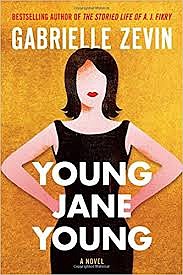Gabrielle Zevin's new novel "Young Jane Young" examines familiar territory: a sex scandal featuring a 20-year-old intern, Aviva, and a married, wildly popular politician in his mid-40s. Zevin explores the situation from a less familiar angle, asking if we can ever truly put the past behind us and successfully reinvent ourselves.
It's 2001 in Miami, and the affair - inevitably discovered - plays out for fictional congressman Aaron Levin the way it typically has for male politicians. With his humiliated but ever devoted wife by his side, he expresses contrition and explains his marriage was in a rocky place. However, going forward, he's determined to work hard to regain the trust of his family and constituents, and it works. The upward trajectory of his political career registers barely a blip as he goes on to continued electoral success.
For Aviva, the consequences of the affair are devastatingly different. There is zero compassion for her. She is ascribed no humanity and becomes nothing more than a stereotype and a joke for comedians, a slutty homewrecker who calculatingly threw herself at a vulnerable man. Her burgeoning political aspirations are trashed before she's taken barely a step toward them. So tainted is her name, she's unwanted even as a volunteer.
Determined to succeed, Aviva sets a radical course and finds eventual success in an unexpected place, in an unexpected field. Older and wiser when her past inevitably comes back to haunt her, she doesn't run this time. Instead, she fights back in a satisfying way that made me want to cheer.
I appreciated Zevin's well-rounded portrayal of Aviva when I read "Young Jane Young" several months ago. Re-reading it now, as we're subjected to an endless stream of allegations of horrifying behavior by men in positions of authority toward women subordinate to them, I felt even more compassion for Aviva.
She's a starry-eyed, idealistic 20 year old, thrilled to be working on the re-election campaign of a rising star politician - the rare kind who actually honors his campaign promises. However, her idealism, combined with a naivete about men, is exploited, consciously or not, by Levin. She's vulnerable to that oft-told tale: My wife doesn't understand me; we're not in love anymore; I'm so lonely. How is it that she became the manipulator in this equation, and Levin, twice her age, worldly and in a position of true power, is the victim? Why do we believe that version of events so readily, so eagerly?
It's a double-standard for the ages, in literature and in life. From Hawthorne's "The Scarlet Letter" to a question posed by my 14-year-old daughter just a week ago, "Why aren't boys ever called sluts?" Why indeed. "Young Jane Young" challenges long-held assumptions in a nuanced and necessary way. I highly recommend it to all.
Lisa Sanning is Public Services Librarian as Missouri River Regional Library.

